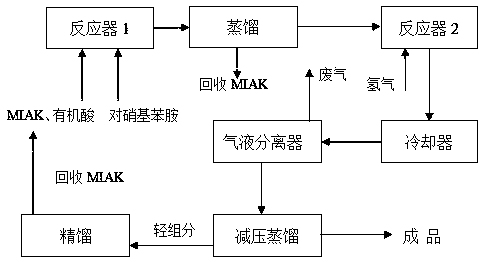Method for continuously preparing n,n'-bis(1,4-dimethylpentyl)-p-phenylenediamine
A technology of dimethylpentyl and p-phenylenediamine, applied in chemical instruments and methods, preparation of amino compounds, preparation of organic compounds, etc., can solve problems such as difficulties in recycling aliphatic ketones, low catalyst cost, and difficulties in recycling , to achieve the effect of saving labor costs, reducing labor intensity, reducing recycling and disposal costs
- Summary
- Abstract
- Description
- Claims
- Application Information
AI Technical Summary
Problems solved by technology
Method used
Image
Examples
Embodiment 1
[0032] The present embodiment includes the following 4 consecutive steps:
[0033] (1) To the reactor 1, according to the molar ratio of p-nitroaniline, 5-methyl-2-hexanone and acid is 1:4.5:0.008, continuously add, maintain the temperature of the reactor 1 at 120-125 ℃, and the mixed material is in the reaction The vessel 1 overflowed after staying for 1 hour, and the material 1 was obtained.
[0034] (2) Material 1 is continuously fed into still 1, unreacted 5-methyl-2-hexanone and water are extracted from the upper part of still 1, and the lower part of still 1 is continuously extracted to obtain material 2. After 24 hours, still 1 is taken Samples taken from the upper part, gas spectrum detection and analysis, the content of 5-methyl-2-hexanone is 92.33%, 5-methyl-2-hexanol is not detected, N,N'-bis(1,4-dimethyl pentyl) p-phenylenediamine was not detected.
[0035] (3) material 2 is continuously transported into the reactor 2 equipped with solid palladium-carbon catalyst...
Embodiment 2
[0038] The operating conditions are the same as in Example 1, but the acid used in step (1) is p-toluenesulfonic acid, and the catalyst used in step (3) is a reduced copper-based catalyst (CuO33W%, Cr 2 O 3 12W%, Al 2 O 3 , 55W%).
[0039] Results: The upper part of the distillation kettle 1 obtained in step (2) was sampled, and the gas spectrum detection and analysis showed that the content of 5-methyl-2-hexanone was 92.43%, 5-methyl-2-hexanone was not detected, N, N'-bis(1,4-dimethylpentyl)-p-phenylenediamine was not detected.
[0040]In step (3), reaction solution 3 is obtained. Gas spectrometry analysis, the content of 5-methyl-2-hexanone is 0.64%, 5-methyl-2-hexanol is 0.13%, N,N'-bis(1,4-dimethylpentyl)p-benzene Diamine content 95.01%.
[0041] The finished product obtained in step (4) was tested, and no p-nitroaniline was detected, and the content of N,N'-bis(1,4-dimethylpentyl)-p-phenylenediamine was 99.14%.
Embodiment 3
[0043] The operating conditions are the same as in Example 1, but the hydrogen pressure in step (3) is 2.0 MPa, and the residence time of the material in the reactor 2 is 1.5 h.
[0044] Results: The upper part of the distillation kettle 1 obtained in step (2) was sampled, and the gas spectrum detection and analysis showed that the content of 5-methyl-2-hexanone was 92.43%, 5-methyl-2-hexanone was not detected, N, N'-bis(1,4-dimethylpentyl)-p-phenylenediamine was not detected.
[0045] In step (3), reaction solution 3 is obtained. Gas spectrometry analysis, the content of 5-methyl-2-hexanone is 0.44%, 5-methyl-2-hexanol is 0.05%, N,N'-bis(1,4-dimethylpentyl)p-benzene The diamine content is 96.01%.
[0046] In the finished product obtained in step (4), no p-nitroaniline was detected, and the content of N,N'-bis(1,4-dimethylpentyl)-p-phenylenediamine was 99.70%.
PUM
 Login to View More
Login to View More Abstract
Description
Claims
Application Information
 Login to View More
Login to View More - R&D
- Intellectual Property
- Life Sciences
- Materials
- Tech Scout
- Unparalleled Data Quality
- Higher Quality Content
- 60% Fewer Hallucinations
Browse by: Latest US Patents, China's latest patents, Technical Efficacy Thesaurus, Application Domain, Technology Topic, Popular Technical Reports.
© 2025 PatSnap. All rights reserved.Legal|Privacy policy|Modern Slavery Act Transparency Statement|Sitemap|About US| Contact US: help@patsnap.com



